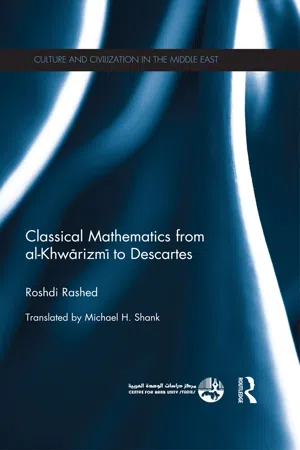![]()
Part I
Algebra
ALGEBRA AND ITS UNIFYING ROLE
The second half of the 7th century witnessed the constitution of the Islamic empire; the 8th century, its institutional and cultural consolidation. Throughout this century, many disciplines emerged that were directly tied to the new society and its ideology, with numerous attempts to found and to develop hermeneutic, Quranic, linguistic, juridical, historical, and theological disciplines. To gauge the breadth of this unprecedented intellectual movement, one need only think of the schools of Kūfā and Baṣra during the second half of the 8th century. One cannot overemphasize the importance of the research that developed at that time in these disciplines. It made possible the creation of the means necessary for the acquisition of other sciences, notably for the reception and the integration of the mathematical sciences and of the philosophical disciplines, for example. It also created the demand for them and molded their context. This same research, which was pursued, was amplified, and branched out in the 9th century, led to two fundamental epistemic results: a new classification of the sciences and a new conception of the encyclopedia of knowledge. Each of these, evidenced first in the domain of scientific research itself, would also be reflected in the awareness that the philosophers had of them. To appreciate this fact, one need only read carefully al-Fārābī’s Enumeration of the Sciences, for example. Algebra, which was constituted at the beginning of the 9th century, played a leading role both in this new classification and in the conception of the new encyclopedia. But the event of algebra’s birth itself around 820 cannot be understood without the light provided by the intellectual context of the 8th century, and without the demand induced by research into the disciplines mentioned above: indeed it was this research that gave algebra its domains of application, and effectively its social justification, as it were.
To recount this 8th-century intellectual – some might say epistemological – context would require a thick book and, to avoid being arbitrary, a wide range of competences. For now, let us do no more than note a few characteristics derived from only two examples. We borrow the first from the founder of Arabic prosody and lexicography, al-Khalīl ibn Aḥmad, and his successors. Ibn Aḥmad elaborated the elements of combinatory analysis necessary to found prosody and to establish the first Arabic dictionary. His method consists in elaborating a priori all possible combinations. Thus, in lexicography, the part that is phonetically realised in accordance with the rules of phonology he elaborated constitutes the real language. But this approach, which we have treated elsewhere,1 was itself possible only thanks to a positive, theologically neutral, conception of language and a new conception of the linguistic object. The body of the language includes both the ‘divine language’ (the Quran), and the language of the ‘pagans’, which the Arabs spoke before Islam, and which we know thanks to poetry and to ethnolinguistic study, which were both thriving at the time. Even more importantly, however, the new linguistic object is a combination of phonemes independent of all phonetic material. Resulting from this formal association are possible words – that is, words with neither phonetic nor semantic value.
Thus, in this discipline, as in prosody and other activities of the time, the arrangements and combinations of elements devoid of signification produced certain knowledge by themselves. In the intellectual context of the 8th century, then, such a concept of the object of knowledge was admissible, and the algebraists adapted themselves perfectly to it. After all, al-Khalīl himself was a mathematician and wrote a book on computation, which has not survived. But the approach of al-Khalīl reflects yet another characteristic of the intellectual landscape of his day: there are no air-tight boundaries between science and art, not only in the respective practice of each, but especially from the theoretical point of view. A particular science – e.g., lexicography – has an end beyond itself, which does not prevent it from being apodictic. It clearly aims to rationalize a practice without, however, ceasing to be a theory. In turn, an art can be conceptualized as the technical means of solving a theoretical problem: the composition of the language, to stay with our lexicographic example. The algebraists adapt themselves to this type of relationship as well.
This example borrowed from the linguists shows at the very least that on the eve of Algebra’s birth, concepts both of apodictic knowledge and of its object had already been elaborated which perfectly suited the algebraists. From this point of view, the intellectual context of the 8th century favored the advent of algebra and made its integration into the midst of the disciplines of the time as natural as it was easy.
The second example shows us that, by providing domains for the application of algebra, the scholars of the 8th century participated in the construction of one of its chapters. Likewise for jurisprudence, which in this same period witnesses the birth of three main schools: Abū Ḥanīfa (died in 767), founder of the school that carries his name, and his student Abu Yusuf (died in 798); Mālik ibn Anas, the head of the school of Medina (died in 795); and finally al-Shāfi‘ī, the founder of the third school, died in 820. These eminent jurists and their students also wrote on legal theory; it is in this respect that their successors compared them to Aristotle in logic. What interests us in particular here is the development in these schools during the 8th century of works in civil law, notably pertinent to wills and to inheritances according to the edicts of the Quran. These rules were often very complex and, to be exact, they required the invention of a genuine calculus. From the outset, this calculus was of an algebraic type. The student of Abū Ḥanīfa and of Mālik ibn Anas, Muḥammad ibn Ḥasan al-Shaybānī (749–803) himself compos...
